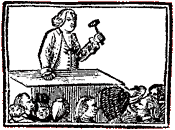Owen Richards’s Lawsuits for Assault
When we left Owen Richards in May 1770, the magistrates of Boston were completely stymied in their inquiry into who had tarred and feathered him that month.
Richards, a Customs officer who had also been part of the disputes that led up to the Liberty riot of 1768, probably suspected those local officials weren’t really trying.
Eventually Richards took legal action himself. In On 24 Dec 1770 the Boston Gazette reported that he had
Meanwhile, in February 1771 the Crown brought criminal charges for the same riot against a man named George Hamblin.
If that seems confusing, all I can say is that I’m not really clear on the whole situation myself. The colonial legal system is hard enough to understand already, few cases like these have left complete records, and I’m relying on mentions in the Legal Papers of John Adams.
TOMORROW: Tracking down the defendants?
Richards, a Customs officer who had also been part of the disputes that led up to the Liberty riot of 1768, probably suspected those local officials weren’t really trying.
Eventually Richards took legal action himself. In On 24 Dec 1770 the Boston Gazette reported that he had
commenced an Action of Damage for Three Hundred Pounds lawful Money, against a young Gentleman of this Town, whose family Connections are among the better sort of folks, the friends of Government.The following 7 January an attorney—probably Samuel Fitch—wrote out a writ on Richards’s behalf, apparently aimed at another attacker:
This Lad was taken by a single Writ and held to Bail—Upon his application to several of his near relations who are persons of fortune, to become sureties for him, we are told, they absolutely refus’d. But others had compassion upon him; for two Gentlemen were bound for his Appearance at Court.
Attach &c. Joseph Doble of Boston &c. Mariner, to answer unto Owen Richards of said Boston Yeoman, in a Plea of Trespass, for that the said Joseph, on the Eighteenth day of May last, 1770, Boston aforesaid, with Force and Arms an Assault on the Body of him the said Owen made and him did then and there violently beat, wound, bruise, and evil entreat, so that his Life was thereby put in great Danger, and He the said Joseph did then and there take and imprison him the said Owen, and him in Prison for a long Time, vizt. for the space of six hours, detained against Law, and the Custom of our Realm, and he the said Joseph then and there, did also grievously abuse the said Owen; forcibly took and placed him in a Cart, and stripped him naked to his Skin, and with Force as aforesaid, did tear off, from his Body, and take from him, his Hatt, Wigg, Coat, Waistcoat, and Shirt, and also a gold Sleeve Button, two Handkerchiefs, his Pocket Book, with sundrie Papers therein of the Value of [blank] vizt. an original Note of Hand, for seven Pounds, Ten Shillings, and Sundrie, original Receipts for Moneys paid, and other Papers of Value, also one Piece of Gold Money, called a Johannes, and two Spanish milled Dollars in Silver, being all of the Value of Thirty Pounds lawfull Money, none of which Things so taken from him the said Owen, have ever been returned to him again and He the said Joseph did then and there also cover and besmear the said Owen, Head, Face, and naked Body, with Tar and cover him over with Feathers, upon said Tar, and cruelly and inhumanly set fire to said Feathers; and then and there dragged said Owen in said Cart, through diverse Streets of said Town of Boston, and from one End of said Town to the other, for the Space of Six Hours, as aforesaid, and fixed a Label to his the said Owens Breast, with Writing thereon importing that he the said Owen was a common Informer, and in that Condition exposed him the said Owen to the Contempt and Resentment of our liege Subjects, and as a public Spectacle, thro said Town, and other Outrages and Enormities, on him the said Owen, He the said Joseph then and there committed, against our Peace, To the Damage &c. £1000.Fitch filed that writ in April 1771, almost a year after the attack and 250 years ago this month. Richards sued two more men named Benjamin Jones and Joseph Akley (Aikley, Heakley) for assault. (That makes three or four suits, depending on whether either Doble, Jones, or Akley was the “young Gentleman” sued in December.)
Meanwhile, in February 1771 the Crown brought criminal charges for the same riot against a man named George Hamblin.
If that seems confusing, all I can say is that I’m not really clear on the whole situation myself. The colonial legal system is hard enough to understand already, few cases like these have left complete records, and I’m relying on mentions in the Legal Papers of John Adams.
TOMORROW: Tracking down the defendants?


No comments:
Post a Comment